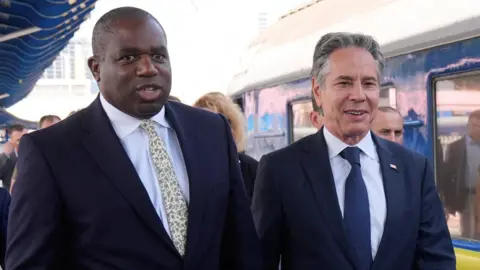 Reuters
ReutersUS Secretary of State Antony Blinken and UK Foreign Secretary David Lammy have arrived in Kyiv on a joint visit as Ukraine continues to press for the right to use US and British long-range missiles against Russia.
The two men travelled together to the Ukrainian capital after talks in London. They are due to meet President Volodymr Zelensky, who has repeatedly called on Washington to loosen the limits on US-supplied weapons.
Blinken said one of their goals was to “hear directly from the Ukrainian leadership” about their “objectives and what we can do to support those needs”.
Earlier, US President Joe Biden said his administration was “working” on whether to lift the restrictions.
The policy will come under further scrutiny when UK Prime Minister Sir Keir Starmer meets Biden at the White House on Friday.
Ukraine’s Prime Minister, Denys Shmyhal, thanked Lammy for the UK’s military support for Ukraine throughout the war.
But he added: “We hope that long-range equipment for strikes on the territory of our enemy will be reached and we will have it and we hope for your help and support in this issue.”
At the moment, the US and UK have not given Ukraine permission to use long-range missiles against targets inside Russia for fear of escalation.
The UK has given Ukraine Storm Shadow missiles, which have a range of about 250km (155 miles). So far, they have been used only against Russian targets in occupied Ukrainian territory.
But Ukrainian leaders say they need the missiles to target air bases used by Russian warplanes to launch devastating glide bombs against Ukraine. These weapons are often launched from deep inside Russian territory.
The Kremlin said on Wednesday that Russia would respond “appropriately” if the US were to allow Ukrainian missile strikes on its territory.
Asked by reporters on Tuesday if the US would lift restrictions on Ukraine’s use of long-range weapons, President Biden said his administration was “working that out now”.
Earlier this year, the US loosened some of the restraints, allowing Ukraine to use long-range missiles to strike areas along Russia’s border where troops are firing from.
Kyiv’s other allies have also been supplying some long-range weapons – with restrictions on how and when they can be used inside Russia, out of concern such strikes could prompt retaliation that draws Nato countries into the war or provokes a nuclear conflict.
During a visit to the UK before travelling to Kyiv, Blinken accused Iran of supplying short-range ballistic missiles to Russia, saying they could be deployed against Ukrainians within weeks. Lammy described Iran’s move as “a significant and dangerous escalation”.
The missiles are likely to boost Russia’s arsenal, enabling it to hit Ukrainian cities close to Russia’s borders or areas it already controls at the same time as it deploys its longer-range missiles deeper into Ukrainian territory.
Iran has repeatedly denied supplying such self-guided weapons to Russia.
Separately on Tuesday, the US, UK, France and Germany imposed fresh sanctions on Iran for supplying Russia with ballistic missiles for use in Ukraine.
Measures included restrictions on national carrier Iran Air’s ability to fly to the UK and Europe – as well as travel bans and asset freezes on a number of Iranians accused of facilitating military support for Russia.
Additional reporting by Thomas Mackintosh in London.

